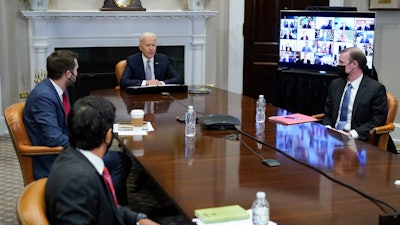
WASHINGTON (AP) — President Joe Biden used a virtual meeting with corporate leaders about a global shortage of semiconductors to push Monday for his $2.3 trillion infrastructure plan, telling them that the U.S. should be the world’s computer chip leader.
“We need to build the infrastructure of today, not repair the one of yesterday,” he told the group of 19 executives from the technology, chip and automotive industries. “China and the rest of the world is not waiting and there’s no reason why Americans should wait.”
He said the country hasn’t made big investments to stay ahead of global competitors, and it needs to step up its game.
Biden made an appearance at the meeting between administration officials and company leaders held to discuss developing a stronger U.S. computer chip supply chain. The meeting came as the global chip shortage continued to plague a wide array of industries.
CEOs of AT&T, Dell, Ford, General Motors, Stellantis (formerly Fiat Chrysler), Intel, Northrop Grumman, and others were scheduled to attend.
But industry experts say there’s little they can do to stem the shortage, which has delayed a new iPhone and forced automakers to temporarily shut factories because they’re running short of the multiple computers needed to run engines, transmissions, brakes and other essential features.
Instead, Biden brought up developing a U.S. chip supply chain since most are made in Asia and shipped to the U.S. In February he ordered a review of the supply chain and pledged to work with international partners to ensure stable supplies.
Wedbush analyst Daniel Ives said there’s little that can be done immediately to end the current problem. “This could change things over the next three to five years, but for right now, there’s no structural changes that could alleviate the shortage,” he said.
The shortage already has made it harder for schools to buy enough laptops for students forced to learn from home, delayed the release of popular products and created mad scrambles to find the latest video game consoles.
But things have worsened in recent weeks, particularly in the auto industry, where factories are shutting down because there aren’t enough chips to finish building vehicles that are becoming rolling computers.
The coronavirus pandemic touched off a cascade of events that led to the problems. Chip factories had to shut down early last year, particularly overseas where most processors are made. By the time they reopened, they had a backlog that was worsened by unforeseen demand. Personal computer demand, for instance, spiked as government lockdowns forced millions of office employees and students to work or attend class remotely.
High demand for consumer electronics squeezed the auto industry. Chip makers compounded the pressure by rejiggering factory lines to better serve the consumer-electronics market, which generates far more revenue for them than autos.
After eight weeks of pandemic-induced shutdown in the spring, automakers started reopening factories earlier than expected. But they found out that chip makers weren’t able to flip a switch quickly and make the more robust processors needed for cars. Industry executives say the shortage should start to end by the third quarter of this year.
It’s merely a symptom of a larger problem of the U.S. relying too much on Asia for critical parts such as semiconductors, said Ives said, who called the meeting long overdue. “I think now it’s just exposing the structural issues as well as some of the potential national security issues the U.S. faces, given our reliance on Asia,” he said.
The U.S. has only 12% of the world’s semiconductor factory capacity, down from 37% in 1990, according to the Semiconductor Industry Association.
Not surprisingly, the major players in the chip industry welcomed the opportunity to gain even more support from the Biden administration to help subsidize the efforts to expand the supply and distribution of processors likely to play an integral role in the economy for decades to come.
“We appreciate the White House meeting with industry leaders about the importance of ensuring a strong and resilient semiconductor supply chain,” said the semiconductor association, a trade group whose board of directors includes three CEOs who participated in Monday’s discussions.
The association’s other members include three major chip players outside the U.S., Samsung, Taiwan Semiconductor Manufacturing Co. and NXP, who sent executives to the meeting.
The shortage comes just as the auto industry is accelerating plans to shift away from internal combustion vehicles, shifting more toward those powered by batteries.
As part of his $2.3 trillion infrastructure plan, Biden wants to spend $174 billion over eight years on electric vehicles. That figure includes incentives for consumers, grants to build 500,000 charging stations, and money to develop U.S. supply chains for parts and minerals needed to make batteries. Biden also wants Congress to put $50 billion into semiconductor manufacturing and research.






















